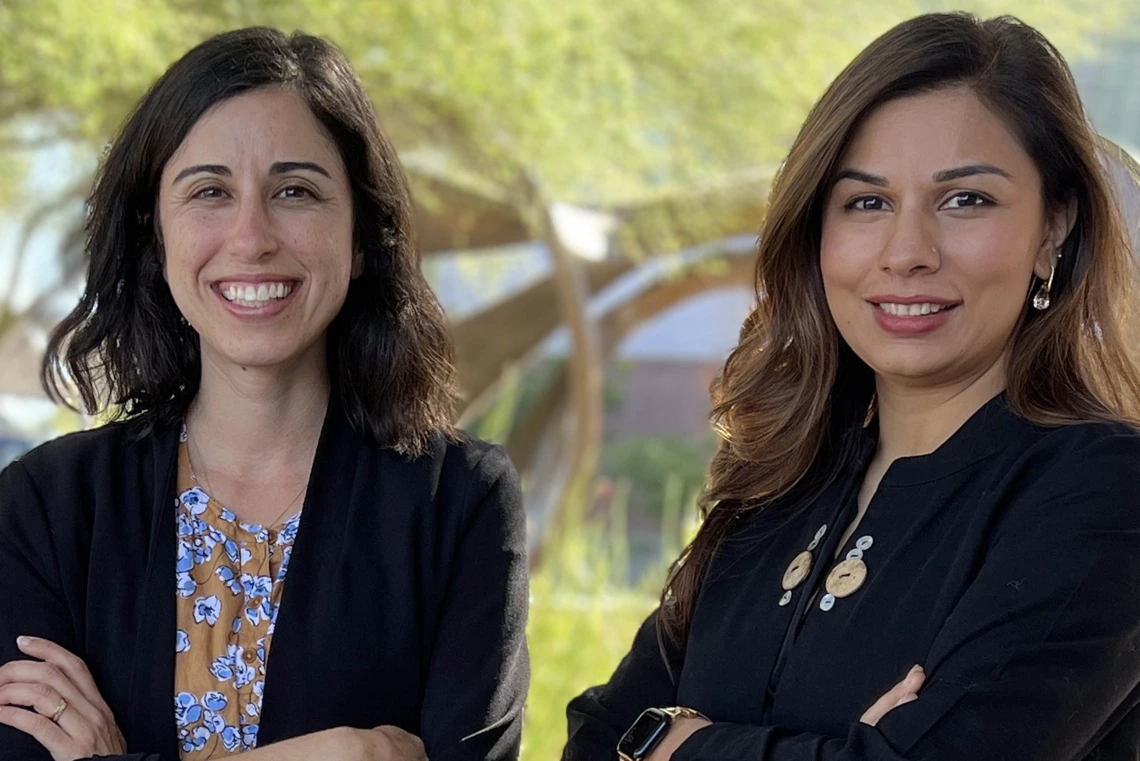New access line can help health care providers treat children with mental health disorders
Psychiatrists from the College of Medicine – Tucson are launching a consultation service for Arizona health care providers who care for children and adolescents experiencing mental illness.

(From left) Arizona Pediatric Psychiatry Access Line co-directors Jacquelin Esque, MD, assistant professor of psychiatry, and Saira Kalia, MD, associate professor of psychiatry, say the free consultation service will increase access to specialized care and help ensure the well-being of Arizona's youth.
Psychiatrists from the University of Arizona College of Medicine – Tucson are launching the Arizona Pediatric Psychiatry Access Line, a consultation service for Arizona health care providers who care for children and adolescents experiencing mental illness.
The Arizona Pediatric Psychiatry Access Line, or APAL, is funded through a $1.9 million grant from the Arizona Health Care Cost Containment System. APAL, which is launching part time May 1, will offer health care providers free consultations on how to treat children and adolescents.
The project comes amid rising rates of mental health disorders among children aged 3-17. Conditions such as anxiety and depression impact an estimated 4.4 million children nationally.
“The shortage of child psychiatrists often necessitates that pediatricians manage children’s mental health during routine visits, despite self-reported limited training as well as limited time and support,” said Saira Kalia, MD, associate professor of psychiatry and co-director of APAL. “This calls for innovation and targeted interventions that can address the unique needs of children and adolescents to ensure their well-being.”
According to child psychiatrist Jacquelin Esque, MD, APAL co-director and assistant professor of psychiatry, Arizona’s lack of child psychiatrists is concerning, especially in rural counties where there is a dearth of access to specialized care.
“APAL aims to bridge that gap by providing health care providers immediate access to expert consultation, along with the resources they need to effectively manage pediatric mental health disorders,” Esque said. “Our collaborative approach will ensure that young people receive comprehensive and holistic care, addressing not only clinical needs, but also educational and social factors that influence their mental well-being.”
Sara Salek, MD, chief medical officer for AHCCCS, said, “In addressing the pressing mental health needs of our children and adolescents, APAL represents an affordable solution to increasing access to specialized care. By providing timely consultations and tailored guidance to health care providers, we are not just treating symptoms, but nurturing resilience and fostering brighter futures for Arizona's youth.”
APAL organizers will collect data on trends of pediatric mental illness in Arizona to inform state and federal health care systems about the best models for care delivery.
“It is thrilling that AHCCCS is supporting this undertaking. The work Drs. Kalia and Esque are doing to launch this line and serve providers and the mental health needs of Arizona’s pediatric patients is impressive and inspirational,” said Jordan F. Karp, MD, professor and chair of the college’s Department of Psychiatry.
“By providing evidence-based guidance on assessment, diagnosis and treatment planning, APAL will empower health care professionals to deliver tailored interventions that meet the unique needs of young patients. This is a crucial addition to Arizona’s pediatric health care landscape.”
APAL’s toll-free number, 1-888-290-1336, is live and open for pediatric consultations weekdays from 12:30 to 4:30 p.m. Health care providers will be connected to a pediatric psychiatrist within minutes to discuss their patient’s case and how to provide the best care.
APAL is a partnership between UArizona Health Sciences, the UArizona College of Medicine – Tucson, Banner – University Medicine and AHCCCS.
Contact
Jamie Manser
College of Medicine – Tucson Department of Psychiatry
520-270-3213, jlmanser@psychiatry.arizona.edu

